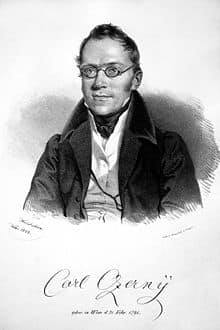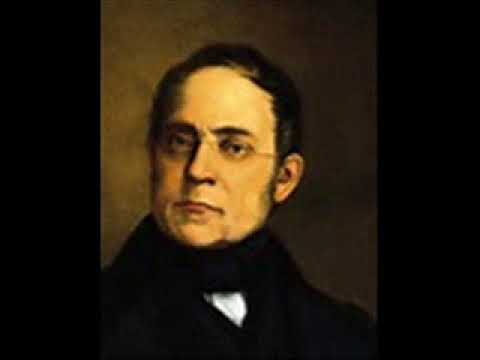명곡감상
오스트리아의 피아니스트 겸 작곡가 카를 체르니카를 체르니 (Carl Czerny, 1791 ~ 1857)의 Piano Concerto No. 1 in D minor
카를 체르니 (Carl Czerny, 1791년 2월 21일 ~ 1857년 7월 15일)는 오스트리아의 피아니스트, 작곡가이다. 그의 이름을 딴 피아노 교본으로 유명하다.
오스트리아 빈 출신의 피아니스트, 작곡가, 음악교사. 루트비히 반 베토벤의 제자들 중 가장 유명한 인물이자, 비르투오소 프란츠 리스트의 스승으로도 알려져 있다. 연주보다는 음악교사로서 많이 활동했다고 하였고, 생애 대부분을 고향인 빈에서 보냈고, 66세의 나이로 죽을 때까지 독신으로 살았다.

– 카를 체르니 (Carl Czerny)
.본명: Carl Czerny
.출생: 1791년 2월 21일, 오스트리아 비엔나
.사망: 1857년 7월 15일, 오스트리아 비엔나
.학력: 빈 음악 및 공연예술 대학교
.직업: 피아니스트, 작곡가, 음악교사
빈에서 태어난 후 처음에 보헤미아 (체코) 출신인 아버지로부터 피아노를 배웠고, 곧 두각을 나타내어 루트비히 판 베토벤의 제자가 되었다. 1800년 첫 연주회로 볼프강 아마데우스 모차르트의 피아노 협주곡을 연주했고, 1812년 베토벤의 황제 협주곡을 연주해 호평을 받았다.
그 후로는 주로 피아노 연주자보다는 피아노 교사로 이름을 알렸으며, 프란츠 리스트도 그의 유명한 제자 중 하나이다. 작곡가로는 1000개에 달하는 많은 작품을 남겼으며, 그 분야도 매우 다양하나, 주로 피아노곡이 알려져 있다.
연습곡이 특히 유명한데, 그 중에서 작품번호 139번, 849번, 299번, 740번은 대한민국에서 각각 체르니 100번, 30번, 40번, 50번으로 알려진 것으로 대한민국에서는 피아노 학습에서 필수적인 곡으로 여겨지고 있다 (체르니 60권, 70권, 110번, 160권도 있지만 잘 알려지지 않았다).
오르간을 위한 작품과 9개의 교향곡, 협주곡 등도 남겼으며, 독실한 가톨릭 신자로 많은 종교 음악도 남겼으나, 이들은 거의 알려지지 않고 있다.

○ Carl Czerny: Piano Concerto No. 1 in D minor
– Carl Czerny (1791-1857)
– Piano Concerto No. 1 in D minor (1812)
I. Allegro molto agitato 0:00
II. Adagio 24:53
III. Allegro molto vivace 29:12
– Rosemary Tuck, piano
– English Chamber Orchestra
– Richard Bonynge, conductor
Carl Czerny ( 1791 – 1857) was an Austrian composer, teacher, and pianist of Czech origin whose vast musical production amounted to over a thousand works. His books of studies for the piano are still widely used in piano teaching. Czerny was born in Vienna (Leopoldstadt) and was baptized in St. Leopold parish. His parents were of Czech origin; his mother was Moravian. His parents spoke the Czech language with him. Czerny came from a musical family: his grandfather was a violinist at Nymburk, near Prague, and his father, Wenzel, was an oboist, organist and pianist. When Czerny was six months old, his father took a job as a piano teacher at a Polish manor and the family moved to Poland, where they lived until the third partition of Poland prompted the family to return to Vienna in 1795. A child prodigy, Czerny began playing piano at age three and composing at age seven. His first piano teacher was his father, who taught him mainly Bach, Haydn and Mozart. He began performing piano recitals in his parents’ home. Czerny made his first public performance in 1800 playing Mozart’s Piano Concerto No. 24 in C minor. In 1801, Wenzel Krumpholz, a Czech composer and violinist, scheduled a presentation for Czerny at the home of Ludwig van Beethoven. Beethoven asked Czerny to play his Pathétique Sonata and Adelaide. Beethoven was impressed with the 10-year-old and accepted him as a pupil. Czerny remained under Beethoven’s tutelage until 1804 and sporadically thereafter. He particularly admired Beethoven’s facility at improvisation, his expertise at fingering, the rapidity of his scales and trills, and his restrained demeanour while performing. Czerny’s autobiography and letters give many important references to Beethoven during this period. Czerny was the first to report symptoms of Beethoven’s deafness, years before the matter became public: “I also noticed with that visual quickness peculiar to children that he had cotton which seemed to have been steeped in a yellowish liquid, in his ears.” Czerny was selected by Beethoven for the premiere of the latter’s Piano Concerto No. 1 in 1806 and, at the age of 21, in February 1812, Czerny gave the Vienna premiere of Beethoven’s Piano Concerto No. 5, “Emperor”. Czerny wrote that his musical memory enabled him to play all the Beethoven works by heart without exception and, during the years 1804–1805, he used to play these works in this manner at Prince Lichnowsky’s palace once or twice a week, with the Prince calling out only the desired opus numbers. Czerny maintained a relationship with Beethoven throughout his life, and also gave piano lessons to Beethoven’s nephew Carl. At the age of fifteen, Czerny began a very successful teaching career. Basing his method on the teaching of Beethoven and Muzio Clementi, Czerny taught up to twelve lessons a day in the homes of Viennese nobility. His ‘star’ pupils included Theodor Döhler, Stephen Heller, Sigismond Thalberg, Leopoldine Blahetka and Ninette de Belleville. Franz Liszt became Czerny’s most famous pupil. He trained the child with the works of Beethoven, Clementi, Ignaz Moscheles and Johann Sebastian Bach. The Liszt family lived in the same street in Vienna as Czerny, who was so impressed by the boy that he taught him free of charge. Liszt was later to repay this confidence by introducing the music of Czerny at many of his Paris recitals. Shortly before Liszt’s Vienna concert of 13 April 1823 (his final concert of that season), Czerny arranged, with some difficulty (as Beethoven increasingly disliked child prodigies) the introduction of Liszt to Beethoven. Beethoven was sufficiently impressed with the young Liszt to give him a kiss on the forehead. Liszt remained close to Czerny, and in 1852 his Études d’exécution transcendente were published with a dedication to Czerny. Czerny left Vienna only to make trips to Italy, France (in 1837, when he was assisted by Liszt) and England. After 1840, Czerny devoted himself exclusively to composition. He wrote a large number of piano solo exercises for the development of the pianistic technique (Gradus ad Parnassum), designed to cover from the first lessons for children up to the needs of the most advanced virtuoso. Czerny died in Vienna at the age of 66. He never married and had no near relatives. His large fortune he willed to charities (including an institution for the deaf), his housekeeper and the Society of Friends of Music in Vienna, after making provision for the performance of a Requiem mass in his memory.
크리스천라이프 편집부
